Listen now (47 mins) | At the Interface of biomedical science and A.I.
Category: biotech/medical – Page 817
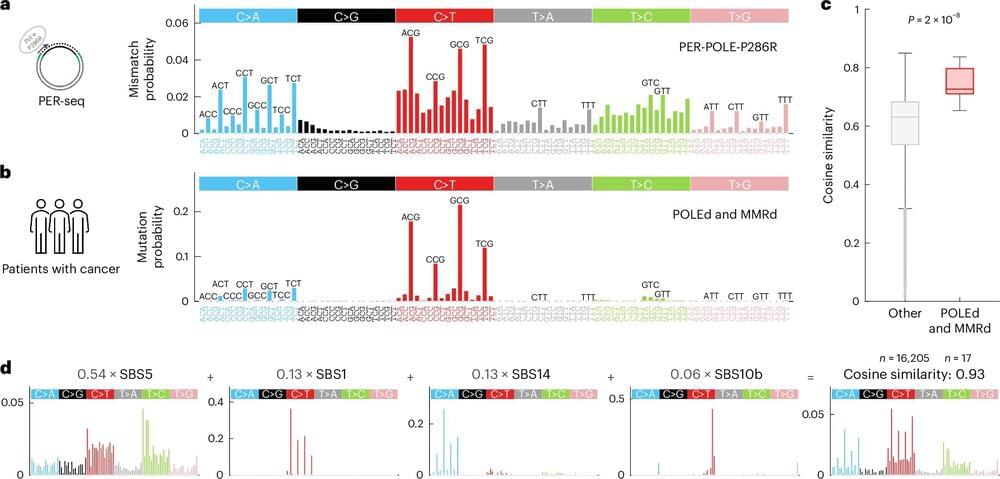
New study challenges longstanding assumption about the cause of the genome’s most common mutation
A Ludwig Cancer Research study has punctured a longstanding assumption about the source of the most common type of DNA mutation seen in the genome—one that contributes to many genetic diseases, including cancer.
Led by Ludwig Oxford Leadership Fellow Marketa Tomkova, postdoc Michael McClellan, Assistant Member Benjamin Schuster-Böckler and Associate Investigator Skirmantas Kriaucionis, the study has implications not only for basic cancer biology but also for such things as assessments of carcinogenic risk associated with environmental factors and our understanding of the emergence of drug resistance during cancer therapy. Its findings are reported in the current issue of Nature Genetics.
The mutation in question—in which cytosine ©, one of the four bases of DNA that spell out our genes, is erroneously switched to thymine (T)—was thought to be primarily the result of a spontaneous chemical reaction with water. This reaction, deamination, is about twice as likely to happen when a cytosine is chemically tagged by the addition of a molecule known as a methyl group to create 5-methylcytosine, which occurs in DNA at so-called “CpG” positions, where C is followed by the base guanine (G).
Infectious Disease Thought Leaders Stream From Progress, Potential, and Possibilities
Enjoy the videos and music you love, upload original content, and share it all with friends, family, and the world on YouTube.
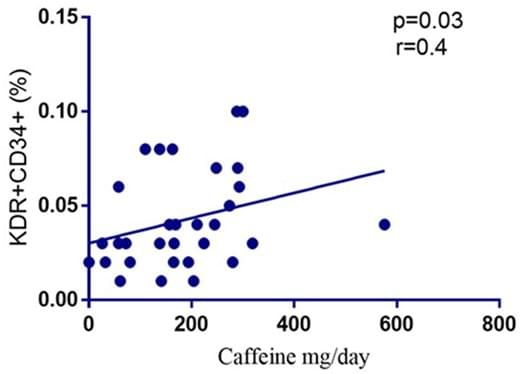
Caffeine improves systemic lupus erythematosus endothelial dysfunction by promoting endothelial progenitor cells survival
Researchers from the Sapienza University of Rome found that caffeine has a positive effect on endothelial cells, a group of cells responsible for vascular regeneration.
We studied the role of caffeine intake on endothelial function in SLE by assessing its effect on circulating endothelial progenitor cells (EPCs) both ex vivo in SLE patients and in vitro in healthy donors (HD) treated with SLE sera.
Methods.
We enrolled SLE patients without traditional cardiovascular risks factors. Caffeine intake was evaluated with a 7-day food frequency questionnaire. EPCs percentage was assessed by flow cytometry analysis and, subsequently, EPCs pooled from six HD were co-cultured with caffeine with and without SLE sera. After 7 days, we evaluated cells’ morphology and ability to form colonies, the percentage of apoptotic cells by flow cytometry analysis and the levels of autophagy and apoptotic markers by western blot. Finally, we performed a western blot analysis to assess the A2AR/SIRT3/AMPK pathway.
Is Intracranial Atherosclerotic Disease Associated with Dementia Risk?
Although intracranial atherosclerotic disease (ICAD) is a known risk factor for cerebrovascular ischemic events, its potential role in dementia risk remains unclear. The Atherosclerosis Risk in Communities (ARIC) study was a prospective cohort study that recruited participants from four U.S. communities. From 2011 to 2013, a subset comprising 1,590 participants (mean age, 77; 40% men; 28% Black) underwent ICAD evaluation and neurocognitive testing to ascertain the prospective association of ICAD with dementia risk, independent of other known cardiovascular risk factors. ICAD was diagnosed based on focal-wall thickness on brain MRI, with or without luminal stenosis on magnetic resonance angiography (MRA).
During a median follow-up of 5.6 years, 286 cases of incident dementia were observed. After adjustment for established dementia risk factors, including cardiovascular risk factors, patients with ICAD (regardless of luminal stenosis) had an independently higher risk for incident dementia than those without ICAD (HR, 1.57; 95% CI, 1.17–2.11). The presence of stenosis 50% on MRA was associated with even higher risk (HR, 1.89; 95% CI, 1.29–2.78). An important limitation was the investigators’ inability to determine dementia subtypes.
This prospective trial adds further observational evidence that ICAD is independently associated with dementia. Furthermore, this study provides evidence that earlier stages of atherosclerosis (i.e., involvement of the arterial wall without luminal narrowing) are also associated with increased risk. While the pathophysiology of this association has yet to be elucidated, I will counsel my patients with ICAD about this association and will strongly recommend proven management strategies (e.g., smoking cessation, lipid lowering) to mitigate vascular disease progression, given the higher risk of dementia in those with luminal disease.
New breakthrough helps free up space for robots to ‘think’, say scientists
Engineers have worked out how to give robots complex instructions without electricity for the first time which could free up more space in the robotic ‘brain’ for them to ‘think’
Mimicking how some parts of the human body work, researchers from King’s College London have transmitted a series of…
This could lead to the next generation of robots being smarter and more social than their predecessors.
Human Immortality | Life Extension | YouTube Documentary
Human Immortality — If you thought Human Immortality was just a concept in science fiction, this episode reveals how it will become science fact. For some scientists featured in this program, achieving Immortality is not a question of ‘If’. The real question is ‘When?’
Human Immortality (2022)
Director: Emma Watts.
Writers: Kyle McCabe, Christopher Webb Young.
Stars: Samantha Brady, Aubrey DeGrey, Leonard Guarente.
Genre: Documentary.
Country: United States.
Language: English.
Release Date: August 31, 2022 (United States)
Synopsis:
If you thought Human Immortality was just a concept in science fiction, this episode reveals how it will become science fact. For some scientists featured in this program, achieving Immortality is not a question of ‘If’. The real question is ‘When?’
One scientist shows how she is making lab-grown organs called ‘ghost hearts’ that not only grow quickly, but that can be accepted in any host’s body without rejection—ending the agony for those waiting for organ transplants. Another biologist is looking at Immortality at the microbiological level. In his lab, he’s identified the ‘longevity gene’ (called SIR2) that can slow the ageing process, and which holds the key that will unlock our ability to better control the rate at which we age. One gerontologist is unearthing the immortal secrets of lobsters, who never stop growing and naturally live up to the astonishing age of 122 years. Inspired by how their bodies regulate cellular division, he’s developing cutting-edge medications that will boost human longevity.
Incredibly, one pioneer is creating a unique medical cocktail that can even reverse ageing. Medical techniques like these could pave the way to Human Immortality.
SUPPORT US!
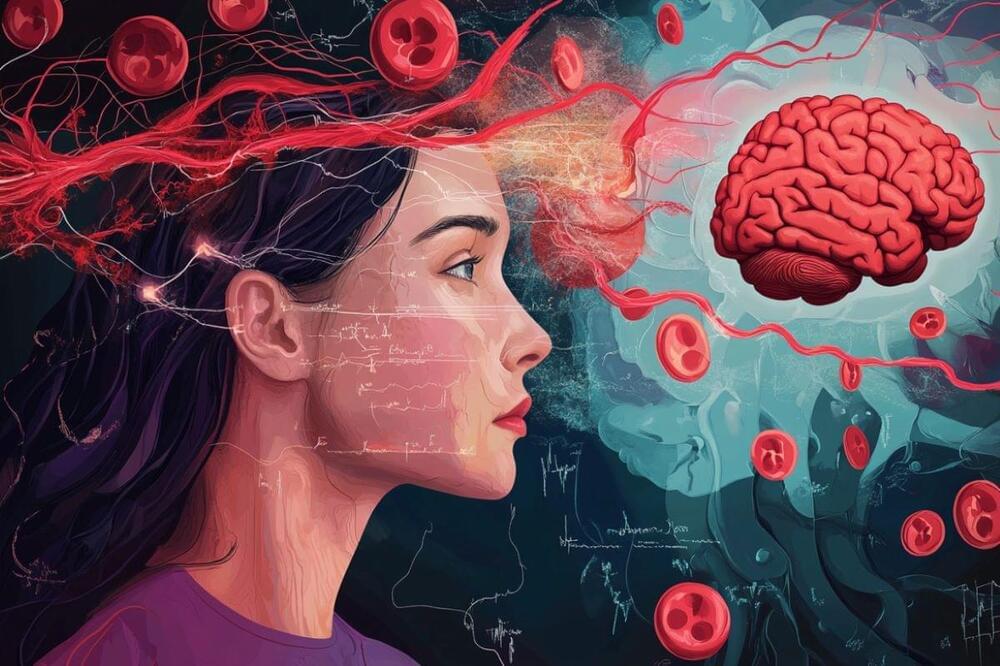
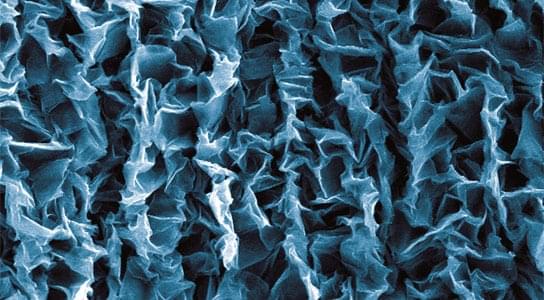
Controlled Graphene Crumpling Used as Artificial Muscle Actuators
Duke University engineers are layering atom-thick lattices of carbon with polymers to create unique materials with a broad range of applications, including artificial muscles.
The lattice, known as graphene, is made of pure carbon and appears under magnification like chicken wire. Because of its unique optical, electrical, and mechanical properties, graphene is used in electronics, energy storage, composite materials, and biomedicine.
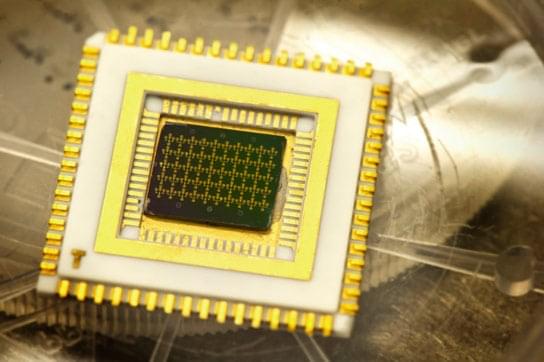
New Nanotechnology AIDS in Electron Cooling Without External Sources
Using a nanoscale structure that consisted of a sequential array of a source electrode, a quantum well, a tunneling barrier, a quantum dot, another tunneling barrier, and a drain electrode, researchers were able to suppress electron excitation and cool electrons to −228 °C (−378 °F) without external means at room temperature.
A team of researchers has discovered a way to cool electrons to −228 °C without external means and at room temperature, an advancement that could enable electronic devices to function with very little energy.
The process involves passing electrons through a quantum well to cool them and keep them from heating.